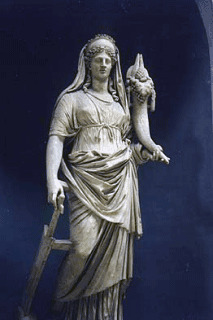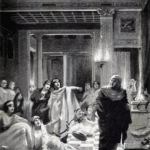Chapters
The fauna was the goddess of fertility and fertility. Considered a sister, wife and even daughter of the god Faunus (depending on the source). She was called to know the future. Identified with Maia. Also called Fatua or Fenta Fauna.
Due to her relationship with Hercules, who fell in love with her, she gave birth to a son, Latynus, the future eponym of Lazio.
Bona Dea
Bona Dea was a very old and holy Roman goddess of women and of healing, who was worshipped only exceptionally by women. It is believed that her real name was Fauna, which, however, was hidden – especially from men. Usually, it is commonly referred to as Bona Dea, meaning “Good Goddess”. The word “Bona” has the connotation of dignity, nobility, honesty, courage, health and equity in Latin (to this day the word “bonus” means some additional gift or other good things). Her Greek counterpart was Damia, and her parents were Picus and Canens.
Bona Dea was the fertility goddess of the mother goddess who protected women from all change, especially virgins and matrons. Serpents and wine were dedicated to her. She blessed women and the earth with fertility when, surprisingly, she was also considered a virgin, virtuous and inviolable by the Romans.
As a fauna, she was often associated with the god Faunus – the god of fertility of fields, forests and animals – who, depending on the message, was her husband, father or brother.
The men couldn’t know her name, pronounce it, or even think about it; they could not take part in the celebrations and holidays dedicated to her. It was impossible to mention either the Myrtus or wine during her feast, because they were sacred to Bona and therefore extremely powerful. To somehow justify the occurrence of such restrictions, a legend was introduced. She says that Faunus’ husband, Faunus, returned home and discovered that she had drunk a whole jug of wine. As punishment, he beat Fauna with a whip of myrtle.
The goddess was believed to have oracle powers that were revealed only to women, and her prophecies took place in her sanctuary on the Aventine Hill. Her statue in this temple showed a woman wearing a crown of vine leaves, with a sceptre (as the Queen of the Earth with her fertile powers) and next to a jug of wine. Other images, in turn, show her as a seated matron, holding in her hand the plough of abundance and the serpent.
Another of her temples was the sanctuary in Ostia.
Bona Dea had its celebration on May 1, which was to commemorate the date of construction of the temple on the Aventine Hill. On that day, gifts were offered to her and prayed to her to avoid earthquakes.
Another festival of it was a secret festival held every year in early December and/or May (day 3 or 4) at the foot of the Aventine Hill. It had the character of secret mysteries. It was held during Faunalia and was only available to women. There were then ceremonies to be performed for the benefit of all the inhabitants of Rome.







